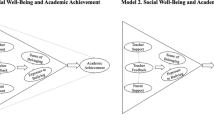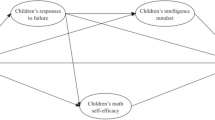Abstract
This study tried to explore the ways in which the construct of academic achievement and failure is conceptualized and represented among different social categories based on educational roles. It was indicated that social representations of academic achievement and failure function in broader social contexts. Findings also suggested that academic achievement and failure are not the antinomies and have multidimensional aspects which collaborate and have greater bearing on the future social outcomes.


Similar content being viewed by others
Notes
We are thankful to Mayank for his constructive help as an independent coder.
A relative measure of chi-square used in correspondence analysis
References
Ansalone, G. (2009). Exploring unequal achievement in the schools: The social construction of failure. New York: Lexington Books.
Arnett, J. J. (2002). The psychology of globalization. American Psychologist, 57(10), 774–783.
Beteille, A. (2007). Classes and communities. Economic and Political Weekly (March 17), 945-952.
Braun, V., & Clark, V. (2006). Using thematic analysis in psychology. Qualitative Research in Psychology, 3, 77–101.
Breakwell, G. M. (1993). Social representations and social identity. Papers on Social Representations [Textes sur les Représentations Sociales (1021–5573)], 2(3), 1–217.
Breakwell, G. (2010). Resisting representations and identity processes. Papers on Social Representations, 19, 6.1–6.11.
Chauhan, A. (2014). Plates for slates: The impact of a school feeding programme on community representations of schools. International Journal of Educational Development. doi:10.1016/j.ijedudev.2014.07.013.
Deaux, K. (1996). Social identification. In E. T. Higgins & A. Kruglanski (Eds.), Social psychology: Handbook of basic principles (pp. 777–798). New York: Guilford.
Duveen, G. (2000). Introduction: The power of ideas. In G. Duveen (Ed.), Social Representations: Studies in Social Psychology (pp. 1–17). Cambridge: Polity Press.
Echabe, A. E., & Castro, J. L. G. (1993). Social knowledge, identities and social practices. Papers in Social Representations, 2(2), 117–125.
Erickson, F. (1987). Transformation and school success: The politics and culture of educational achievement. Anthropology & Education Quarterly, 18(4), 335–356.
Farr, R. (1996). The roots of modern social psychology. Oxford: Blackwell. Retrieved from Jawaharlal Nehru University, New Delhi
Foster, M. A., Lambert, R., Abbott-Shim, M., McCarty, F., & Franze, S. (2005). A model of home learning environment and social risk factors in relation to children’s emergent literacy and social outcomes. Early Childhood Research Quarterly, 20(1), 13–36.
Ganapathi-Coleman, H. (2014). ‘Teachers are always good. Chrildern have flaws’: Memories of school and learning in the narratives of low income parents in India. Psychology & Developing Societies, 26(1), 29–58.
Gillespie, A., Howarth, C., & Cornish, F. (2012). Four problems for researchers using social categories. Culture & Psychology, 18(3), 391–402.
Hair, J. F., Black, W. C., Babin, B. J., Anderson, R. E., & Tatham, R. L. (2006). Multivariate data analysis. New Delhi: Pearson Education, Inc.
Harre, R. (1984). Some reflections on the concept of “social representations”. Social Research, 51, 927–938.
Howarth, C. (2006). A social representation is not a quiet thing: exploring the critical potential of social representations theory. British Journal of Social Psychology, 45(1), 65–86.
Inzlicht, M., & Good, C. (2006). How environments threaten academic performance, self-knowledge, and sense of belonging. In S. Levin & C. Van Laar (Eds.), Stigma and Group Inequality: Social Psychological Approaches (pp. 129–150). Mahwah, NJ: Erlbaum.
Jahoda, G. (1988). Critical notes and reflections on ‘social representations. European Journal of Psychology, 18(3), 195–209.
Kincheloe, J. L. (2005). Critical constructivism primer. New York: Peter Lang.
Kraus, M. W., Piff, P. K., & Keltner, D. (2009). Social class, the sense of control, and social explanation. Journal of Personality and Social Psychology, 97, 992–1004.
Kumar, K. Y. (2009). Understanding the education system: An eco-behavioural approach. Economic & Political Weekly, 44(23), 61–69.
Lareau, A. (2000). Home advantage: Social class and parental intervention in elementary education. Maryland: Rowman & Littlefield Publishers, Inc.
Maertens, A. (2011). Does education pay off ? Subjective expectations on education in rural India. Economic & Political Weekly, 46(09), 58–63.
Majumdar, M., & Mooij, J. (2012). The marks race’: India’s dominant education regime and new segmentation. In C. Sleeter, S. B. Upadhyay, A. K. Mishra, & S. Kumar (Eds.), School education, pluralism and marginality: Comparative Perspectives (pp. 207–248). New Delhi: Orient Blackswan.
Melkote, R. S., Revathi, E., Lalita, K., Sajaya, K., & Suneetha, A. (2010). The movement for Telangana: Myth and reality. Economic and Political Weekly, XLV(2), 8–11.
Miguel, I., Valentim, J. P., & Carugati, F. (2010). Intelligence and its development: Social representations and social identities. Papers on Social Representations, 19, 20.1–20.33.
Mishra, R. C. (2014). Effects of Sanskrit schooling on cognitive and social processes. Psychology & Developing Societies, 26(1), 1–27.
Mishra, R. C., & Vajayee, A. (2000). Intervention for cognitive development of disadvantaged children. In A. K. Mohanty & G. Misra (Eds.), Psychology of poverty and disadvantage (pp. 214–229). New Delhi: Concept Publishing Company.
Misra, G., & Jain, U. (2000). Achievement cognition in deprived groups: An attributional analysis. In A. K. Mohanty & G. Misra (Eds.), Psychology of poverty and disadvantage (pp. 168–179). New Delhi: Concept Publishing Company.
Mohanty, A. K. (2000). Perpetuating inequality: The disadvantage of language, minority mother tongues and related issues. In A. K. Mohanty & G. Misra (Eds.), Psychology of poverty and disadvantage (pp. 104–117). New Delhi: Concept Publishing Company.
Moscovici, S. (1988). Notes towards a description of social representations. European Journal of Social Psychology, 18(3), 195–209.
Moscovici, S. (1993). The invention of society: Psychological explanations for social phenomena. UK: Polity Press [Retrieved from Jawaharlal Nehru University Library].
Munslow, A. (1997). Deconstructing history. New York: Routledge.
Ogbu, J. U. (2004). Collective identity and the burden of “acting White” in Black history, community, and education. The Urban Review, 36(1), 1–35.
Paryente, B., & Orr, E. (2006). Identities in conflict. In what sense? Megamot, 46, 247-276.
Potter, J., & Litton, I. (1985). Some problems underlying the theory of social representations. British Journal Journal of Social Psychology, 24, 81–90.
Pougnet, E., Serbin, L. A., Stack, D. M., & Schwartzman, A. E. (2011). Fathers’ influene on children’s cognitive and behavioural functioning: A longitudinal study of Canadian Families. Canadian Journal of Behavioural Science, 43(3), 173–182.
Ramachandran, V. K., Rawal, V., & Swaminathan, M. (2009). Socioeconomic surveys of three village in Andhra Pradesh: A study of agrarian relations. New Delhi: Tulika Books.
Rao, G. G. (2013). Hyderabad and the bifurcation of Andhra Pradesh. Economic & Political Weekly, XLVIII, 42, 39–43.
Rati, H., & Snellman, L. (1998). Social representations of educability. Social Psychology of Education, 1(4), 359–373.
Reeves, A. (2014). Neither class nor status: Arts participation and the social strata. Sociology, 1-19. DOI: 10.1177/0038038514547897
Roopnarine, J. L., Krishnakumar, A., & Vadgama, D. (2013). Indian fathers: Family dynamics and investment patterns. Psychology and Developing Societies, 25(2), 223–247.
Sen, R. (2011). Do ‘sacred cows’ make an academic culture bovine? A comment Jovchelovitch. Papers on Social Representations, 20, 14.1–14.5.
Simon, B., & Klandermans, B. (2001). Politicized collective identity. A social psychological analysis. American Psychologist, 56, 319–331.
Singh, A. K. (2000). Are the poor less intelligent? Or, much ado about nothing. In A. K. Mohanty & G. Misra (Eds.), Psychology of poverty and disadvantage (pp. 157–167). New Delhi: Concept Publishing Company.
Sinha, J. B. P. (2002). Towards indigenization of psychology in India. In G. Misra & A. K. Mohanty (Eds.), Perspectives on indigenous psychology (pp. 440-457). New Delhi: Concept.
Sinha, C. (2013). The sociocultural psychology as a postformal theory of academic achievement: An interrogation into the legitimacy of formal education. International Journal of Educational Psychology, 2(2), 221–242.
Thomas, V., & Azmita, M. (2014). Does class matter?The centrality and meaning of social class identity in emerging adulthood. Identity: An international Journal of Theory and Research, 14, 195–213.
Voelklein, C., & Howarth, C. (2005). A review of controversies about social representations theory: a British debate. Culture and psychology, 11(4), 431–454.
Wagner, W., Duveen, G., Farr, R., Jovchelovitch, S., Lorenzi-Cioldni, F., Markova, I., & Rose, D. (1999). Theory and method of social representations. Asian Journal of Social Psychology, 2(1), 95–125.
Winne, P. H., & Nesbit, J. C. (2010). The psychology of academic achievement. Annual Review of Psychology, 61, 653–678.
Author information
Authors and Affiliations
Corresponding author
Rights and permissions
About this article
Cite this article
Sinha, C., Mishra, A.K. The Social Representations of Academic Achievement and Failure. Psychol Stud 60, 160–169 (2015). https://doi.org/10.1007/s12646-014-0285-3
Received:
Accepted:
Published:
Issue Date:
DOI: https://doi.org/10.1007/s12646-014-0285-3




